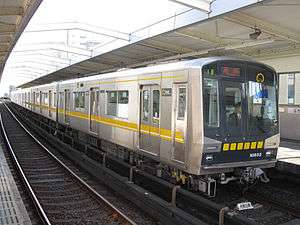Nagoya Municipal Subway N1000 series
| Nagoya Municipal Subway N1000 series | |
|---|---|
|
Nagoya Municipal Subway N1000 series, March 2010 | |
| In service | March 2008–Present |
| Manufacturer | Nippon Sharyo |
| Replaced | 5000 series |
| Constructed | 2007–2013 |
| Number built | 126 vehicles (21 sets) |
| Number in service | 126 vehicles (21 sets) (As of 1 July 2015) |
| Formation | 6 cars per trainset |
| Capacity | 618 |
| Operator(s) | Transportation Bureau City of Nagoya |
| Depot(s) | Fujigaoka |
| Line(s) served | Higashiyama Line |
| Specifications | |
| Car body construction | Stainless steel |
| Car length | 15,580 mm (51.12 ft) |
| Width | 2,548 mm (8.360 ft) |
| Height | 3,440 mm (11.29 ft) |
| Floor height | 900 mm (35 in) |
| Doors | 3 pairs per side |
| Maximum speed | 65 km/h (40 mph) |
| Acceleration | 3.3 km/h/s |
| Electric system(s) | 600 V DC |
| Current collection method | Third rail |
| Braking system(s) | Brake-by-wire regenerative braking air brakes |
| Safety system(s) | ATC |
| Track gauge | 1,435 mm (4 ft 8 1⁄2 in) |
The Nagoya Municipal Subway N1000 series (名古屋市交通局N1000形) is a rapid transit electric multiple unit (EMU) train type operated by the Transportation Bureau City of Nagoya on the Nagoya Subway Higashiyama Line in Japan since 2008.
Formation
As of 1 April 2015, the fleet consists of 20 six-car sets, formed as follows.[1][2]
| Car No. | 1 | 2 | 3 | 4 | 5 | 6 |
|---|---|---|---|---|---|---|
| Designation | Tc1 | M1 | M2 | M2' | M1' | Tc2 |
| Numbering | N1100 | N1200 | N1300 | N1400 | N1500 | N1600 |
| Weight (Metric tons) | 21.5 | 25.0 | 23.8 | 23.8 | 25.0 | 21.5 |
| Capacity Total/seated |
97/31 | 106/37 | 106/37 | 106/37 | 106/37 | 97/31 |
One car is designated as a "women-only car" during the morning and evening peak periods on weekdays as a measure to reduce sexual assault during crowded times.[3]
Interior
- Interior view of newly delivered N1000 series set, November 2007
Build histories
The individual unit build details are as follows. (Details are not available for the first sets, N1101 to N1104).[1]
| Set No. | Manufacturer | Delivery date |
|---|---|---|
| N1101 | - | - |
| N1102 | - | - |
| N1103 | - | - |
| N1104 | - | - |
| N1105 | Nippon Sharyo | 23 July 2012 |
| N1106 | Nippon Sharyo | 3 August 2012 |
| N1107 | Nippon Sharyo | 21 August 2012 |
| N1108 | Nippon Sharyo | 7 September 2012 |
| N1109 | Nippon Sharyo | 26 November 2012 |
| N1110 | Nippon Sharyo | 12 December 2012 |
| N1111 | Nippon Sharyo | 22 May 2013 |
| N1112 | Nippon Sharyo | 18 June 2013 |
| N1113 | Nippon Sharyo | 4 July 2013 |
| N1114 | Nippon Sharyo | 7 October 2013 |
| N1115 | Nippon Sharyo | 29 October 2013 |
| N1116 | Nippon Sharyo | 26 June 2014 |
| N1117 | Nippon Sharyo | 17 July 2014 |
| N1118 | Nippon Sharyo | 29 July 2014 |
| N1119 | Nippon Sharyo | 17 February 2015 |
| N1120 | Nippon Sharyo | 4 March 2015 |
| N1121 | Nippon Sharyo | 23 April 2015[4] |
References
- 1 2 私鉄車両編成表 2015 [Private Railway Rolling Stock Formations - 2015] (in Japanese). Japan: Kotsu Shimbunsha. 23 July 2015. p. 95. ISBN 978-4-330-58415-7.
- ↑ 5000形(東山線)の主要緒元 [N1000 series (Higashiyama Line) technical details]. Rolling stock guide (in Japanese). Transportation Bureau City of Nagoya. Retrieved 15 November 2010.
- ↑ 女性専用車両 [Women-Only Cars]. Information (in Japanese). Transportation Bureau City of Nagoya. Retrieved 15 November 2010.
- ↑ 私鉄車両のうごき [Private railway rolling stock changes]. Tetsudō Daiya Jōhō Magazine (in Japanese). Vol. 44 no. 378. Japan: Kōtsū Shimbun. October 2015. p. 127.
External links
| Wikimedia Commons has media related to Nagoya Municipal Subway N1000 series. |
This article is issued from Wikipedia - version of the 7/26/2016. The text is available under the Creative Commons Attribution/Share Alike but additional terms may apply for the media files.
